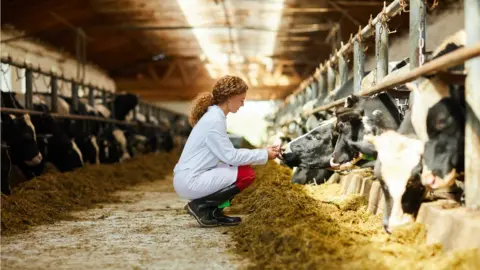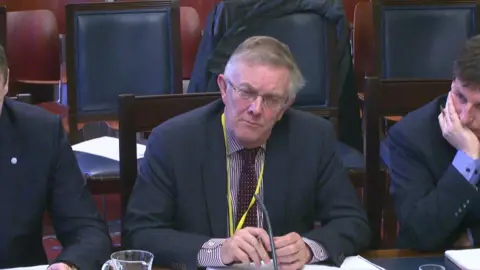Farming: Stormont urged to match EU funding of £290m
 shironosov
shironosovFarmers will need at least as much domestic financial support in the future as they were receiving from the EU, representatives from the industry have told a Stormont committee.
The Ulster Famers' Union (UFU) and the Northern Ireland Agricultural Producers' Organisation were before the agriculture and environment committee.
Last year, NI farmers received EU direct payments of £293m.
UFU president Ivor Ferguson said that needed to be matched by Stormont.
'Trade deals discriminate'
He told the committee they would need at least that amount in order to remain competitive with farmers in the Republic of Ireland.
And he said more might be required if the terms of future UK trade deals discriminated against farmers in Northern Ireland.
Under the Northern Ireland protocol, farmers would be bound by EU standards, which could push up the cost of production compared to competitors in their main GB market, where standards might be lower.

Mr Ferguson said he would like to see the shape of a future agriculture policy for Northern Ireland delayed until the implications of future trade deals were better understood.
Business leaving NI
He said there was already evidence that agri-food firms which had traditionally sourced material in Northern Ireland were switching that business to Great Britain to circumvent potential future trade disruption caused by the Irish Sea border and any additional paperwork and checks.
"It's not something that might happen in the future, it's happening at the moment and it's a major concern for us," he said.
Mr Ferguson also said farmers would hope to see between 30 to 50% of their support payment being linked to the amount of land they farmed, with top-ups available for things like animal welfare schemes or environmental measures.
Agriculture Minister Edwin Poots does not favour large area-based payments, favouring different ways of rewarding what he has described as "productive farms".
NI farmers 'losing out'
The Northern Ireland Agricultural Producers Association said the government would have to be "held to account" if future trade deals flew in the face of UK climate commitments.
Sean McAuley told the committee it was nonsensical for companies to be allowed to import food from "the other side of the world" when there was a supply of it on the doorstep and NI farmers were "losing out".
The committee was told that the value of direct payments equated to the total income for many farms.
"Without support, there is no farm income," NIAPA chairman James Lowe told MLAs.
